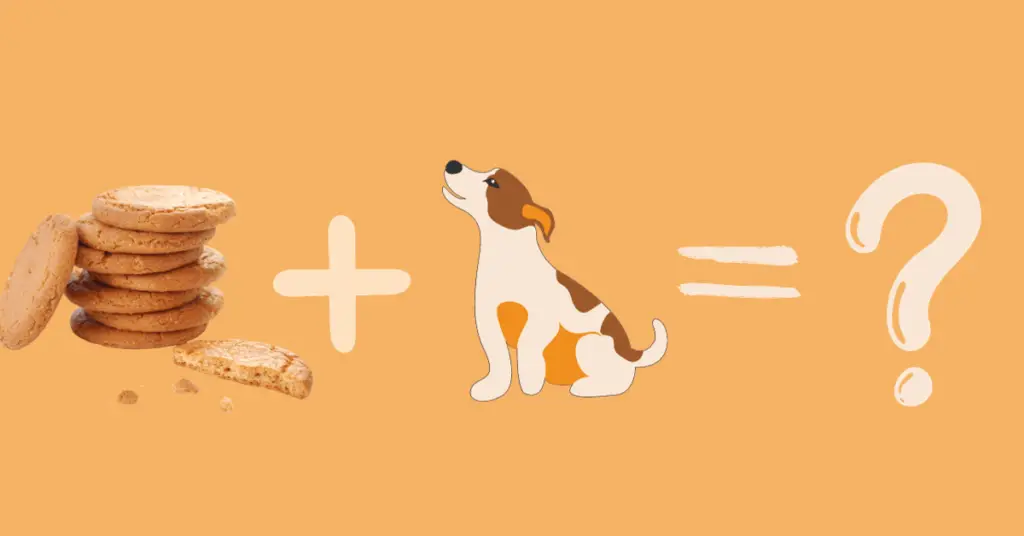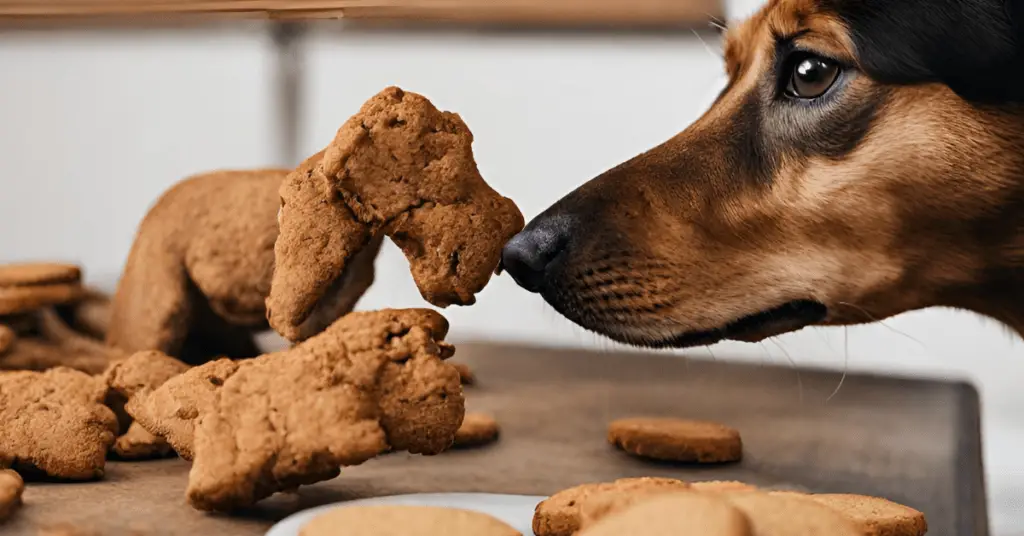
In the world of canine culinary curiosities, ginger biscuits emerge as a flavorful yet uncertain option. As responsible pet parents, understanding the potential implications of offering ginger biscuits to our beloved dogs is paramount. It’s not merely about the taste but the safety and well-being of our faithful four-legged friends that we hold dear. So, let’s embark on this journey to unravel the layers of this delectable mystery and uncover if ginger biscuits make a suitable addition to our canine’s menu. Can dogs eat ginger biscuits? Let’s dig deeper to find out.
Ginger Biscuits: What’s Inside?
To understand the implications of ginger biscuits for dogs, we need to inspect the ingredients they contain and their potential effects on our four-legged friends.
| Nutritional Component | Amount per 100g |
| Calories | 449 kcal |
| Carbohydrates | 73.9 g |
| Sugars | 38.1 g |
| Dietary Fiber | 1.9 g |
| Fat | 15.5 g |
| Saturated Fat | 7.7 g |
| Trans Fat | 0.4 g |
| Protein | 5.5 g |
| Sodium | 0.61 g |
Can dogs have ginger biscuit?
Yes, Dogs Can Have Ginger Biscuits. In moderation and with caution, dogs can enjoy ginger biscuits. However, it’s crucial to be mindful of the ingredients, particularly avoiding harmful components like xylitol or chocolate. Always consult your veterinarian before introducing any new treat into your dog’s diet to ensure it aligns with their specific health requirements and dietary needs. Responsible and informed treat-giving ensures a happy and healthy canine companion.
Is ginger biscuit safe for dogs?
Ginger Biscuits are not recommended for Dogs on daily basis. Ginger biscuits, designed for human consumption, often contain ingredients like sugar and spices that aren’t suitable for dogs. The high sugar content and potential additives can lead to digestive issues and health complications in dogs. It’s safer and wiser to opt for treats specifically formulated for canine consumption to ensure their well-being.
Dogs and Ginger Biscuits: A Digestive Dilemma

Delving into the canine digestive system provides valuable insights into how dogs process ginger biscuits once they enter their stomachs. Dogs, like humans, have distinct digestive processes that play a crucial role in determining the suitability of various foods for their consumption.
As the ginger biscuit travels to the stomach, it encounters the powerful acids and enzymes that break down the components of the treat. The stomach’s acidic environment assists in breaking down proteins, fats, and carbohydrates present in the biscuit.
Can dogs eat ginger biscuits? However, ginger biscuits often contain ingredients that can pose challenges for a dog’s digestive system. The high sugar content and certain additives may not align with a dog’s dietary needs. Dogs lack certain enzymes to efficiently break down sugars, potentially leading to digestive upset. Moreover, the presence of fats, common in biscuits, can put a strain on a dog’s digestive tract, especially if they have a sensitive stomach.
Understanding how ginger biscuits interact with a dog’s digestive system is essential in determining if they are a suitable treat. It’s not only about taste but also about how well their bodies can process and derive nutrition from the biscuit.
Risks and Caution of Ginger Biscuits for Dogs
While ginger biscuits might seem like a tempting treat to share with your furry friend, it’s important to be aware of potential risks and exercise caution when considering this snack for dogs.
- High Sugar Content: Ginger biscuits often contain a high amount of sugar, which can be harmful to dogs. An abundance of sugar can contribute to weight gain, dental issues, and potentially diabetes in dogs.
- Digestive Issues: The ingredients in ginger biscuits, including flour and sugar, may be difficult for some dogs to digest. This can lead to gastrointestinal upset, including diarrhea, vomiting, or constipation.
- Allergies and Sensitivities: Dogs, like humans, can have allergies or sensitivities to certain ingredients present in ginger biscuits. Common allergens like wheat or artificial additives can cause allergic reactions in sensitive dogs.
- Possible Toxic Ingredients: Some ginger biscuits may contain ingredients like chocolate, nuts, or raisins, which are toxic to dogs. Even a small amount of these substances can cause serious health issues, such as kidney failure or poisoning.
- Calorie Overload: Ginger biscuits are often high in calories. Feeding them regularly to your dog without considering their overall diet can lead to weight gain and associated health problems.
- Impact on Blood Glucose Levels: The high sugar content in ginger biscuits can cause a rapid spike in a dog’s blood sugar levels, potentially leading to hyperactivity followed by a sudden energy crash.
Caution:
- Consult Your Vet: Before introducing any new food or treat to your dog’s diet, including ginger biscuits, it’s crucial to consult your veterinarian. They can provide guidance based on your dog’s specific health, dietary needs, and any preexisting conditions.
- Moderation: If your vet approves and your dog doesn’t show any adverse reactions, offer ginger biscuits in moderation. Treats ought to make up a modest fraction of your dog’s complete dietary intake.
- Read Labels Carefully: If you choose to share a ginger biscuit with your dog, carefully read the ingredients to ensure there are no harmful substances like chocolate, xylitol, or raisins.
- Watch for Reactions: Monitor your dog after giving them a small piece of ginger biscuit for any signs of digestive issues, allergic reactions, or unusual behavior. If you notice anything concerning, contact your veterinarian immediately.
Safe alternative to ginger biscuit
When it comes to treating your furry friend, there are numerous dog-friendly biscuit options that you can consider, providing a safe and tasty treat for your beloved pet.
- Peanut Butter Biscuits
- Sweet Potato Biscuits
- Pumpkin Biscuits
- Carrot Biscuits
- Apple Biscuits
- Oatmeal Biscuits
- Cheese Biscuits
- Banana Biscuits
- Coconut Biscuits
- Grain-Free Biscuits
Always ensure that any biscuit or treat you choose for your dog is free from harmful ingredients like chocolate, xylitol, raisins, or excessive salt.
Related FAQs
Conclusion
The question “can dogs eat ginger biscuits?” is one that requires careful consideration and responsible pet parenting. Understanding our dog’s unique needs and consulting our veterinarians can guide us in making informed choices about what treats are best for our fur babies. Always prioritize your pet’s well-being and consult a professional for advice on the appropriate diet for your dog.

Rattling great info can be found on site.Raise your business